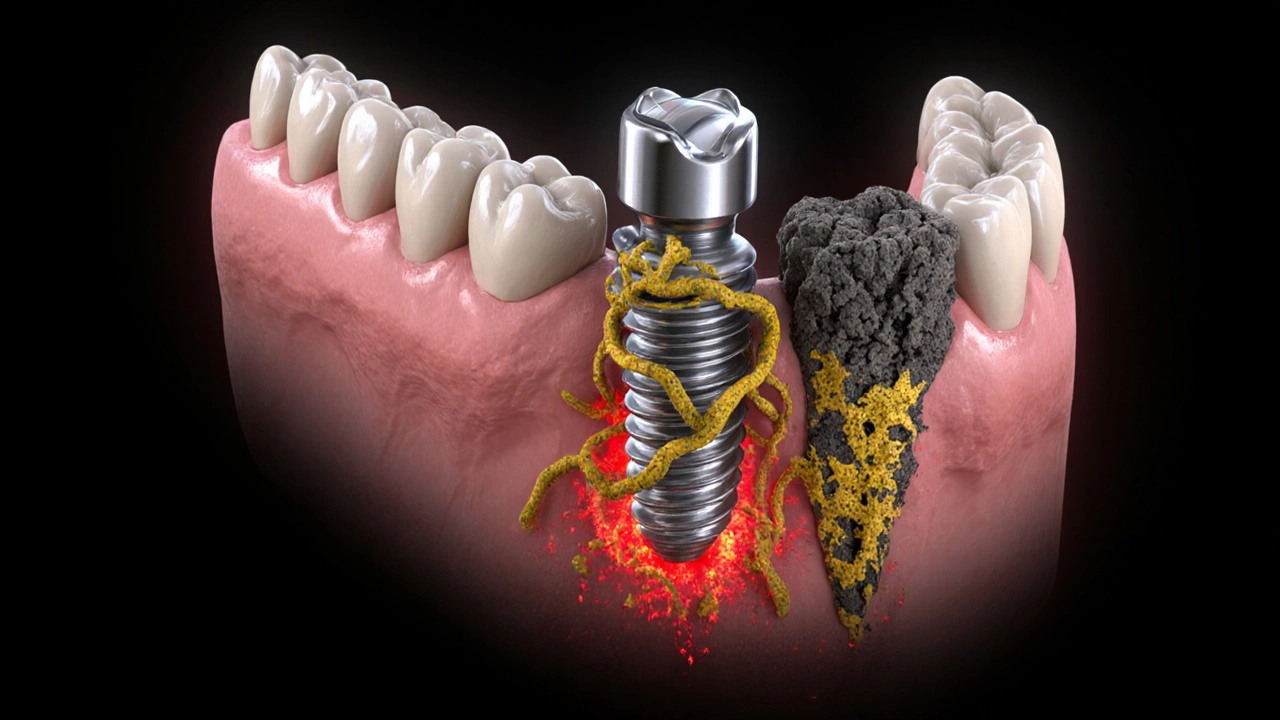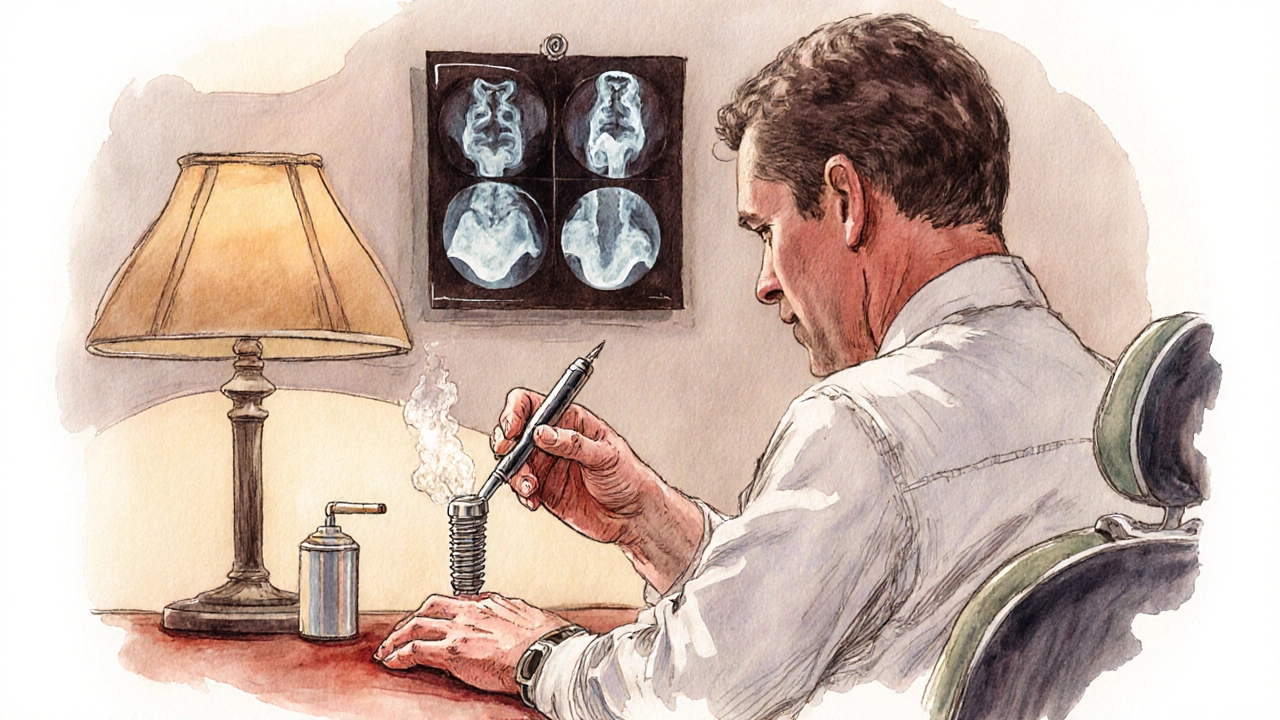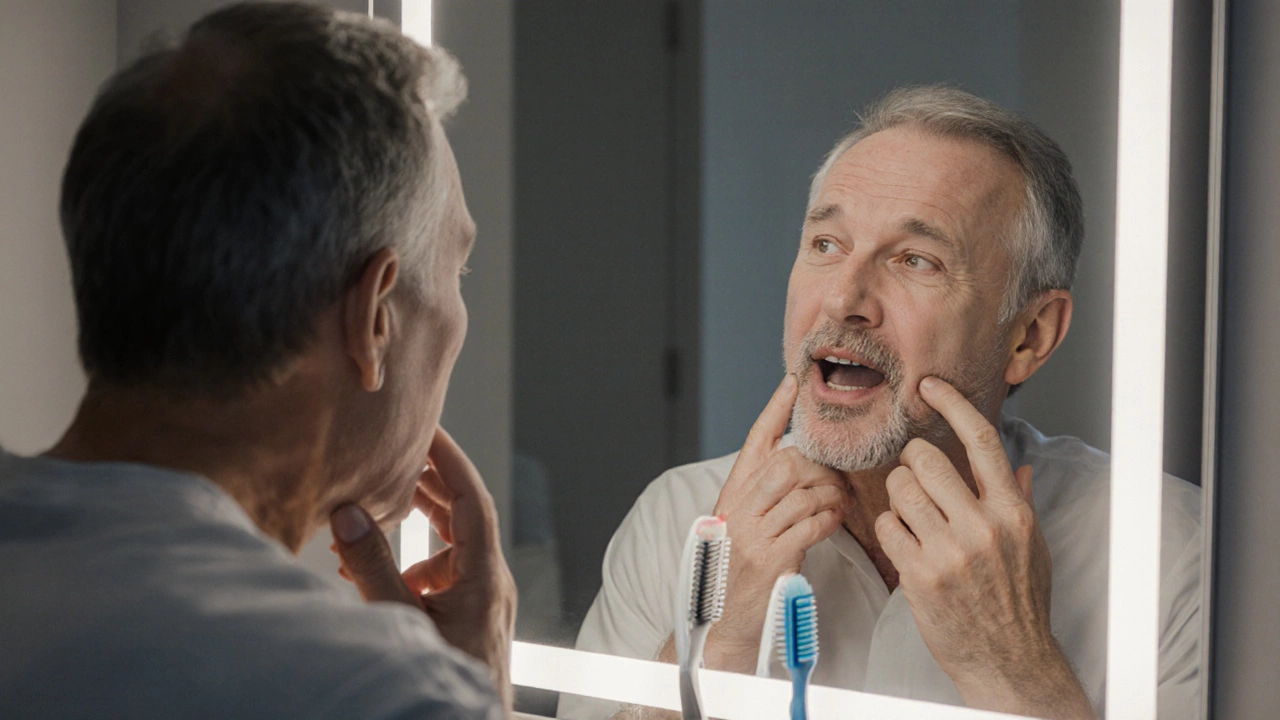Leaving dental implants in too long might sound like a good idea-after all, they’re meant to last. But if you ignore signs of trouble or skip follow-up care, what seems like a permanent fix can turn into a slow-burning problem. In the UK, over 100,000 dental implants are placed each year. Most succeed, but a surprising number of patients don’t realize the risks of neglecting long-term care until it’s too late.
Implants Don’t Last Forever-Even If They’re Supposed To
Dental implants are designed to be permanent. The titanium post fuses with your jawbone through a process called osseointegration. That sounds solid, right? But fusion doesn’t mean immunity. Over time, things can go wrong if you don’t maintain them properly. The implant itself might stay intact, but the tissues around it don’t. That’s where the real damage starts.
Unlike natural teeth, implants don’t have nerves or blood vessels. You won’t feel pain early on. That’s why people often miss the warning signs. A loose crown, bleeding gums, or a weird taste in your mouth? These aren’t normal. They’re red flags.
The Hidden Threat: Peri-Implantitis
The biggest risk of leaving implants in too long without care is peri-implantitis. It’s an inflammatory condition caused by bacteria buildup around the implant. Think of it like gum disease, but for your implant. Studies show that up to 20% of patients develop this condition within 10 years if oral hygiene slips.
Here’s how it unfolds:
- Bacteria form plaque around the implant neck
- Plaque hardens into tartar, which you can’t brush off
- Immune system reacts, causing gum inflammation
- Bone starts to break down around the implant
- Eventually, the implant becomes loose and fails
This isn’t rare. A 2024 review in the Journal of Clinical Periodontology found that patients who skipped professional cleanings every 6 months were 3.5 times more likely to lose an implant than those who didn’t.
What Happens When Bone Starts to Go
Your jawbone needs stimulation to stay strong. Natural teeth do this when you chew. Implants do too-but only if they’re healthy. Once infection sets in, the bone begins to resorb. You won’t feel it. But over time, your jaw shrinks. That changes your face.
People don’t realize how much bone loss affects appearance. Sunken cheeks, a drooping lower face, wrinkles around the mouth-these aren’t just aging. They’re signs your jaw is deteriorating. And once bone is gone, it’s hard to rebuild. You might need a bone graft before you can even replace the failed implant.

Implant Failure Isn’t Always Sudden
Most people think implant failure means the whole thing falls out. It rarely happens like that. More often, it’s a slow decline. You notice your crown feels different. Your bite feels off. Your gums are swollen but don’t hurt. You tell yourself it’s just irritation. Then one day, your dentist says the implant is mobile. It can’t be saved.
Why? Because the damage was already done. By the time you feel discomfort, the bone loss is often advanced. That’s why regular check-ups matter. Your dentist uses X-rays and probing tools to measure bone levels. They catch problems before you feel them.
Who’s at Highest Risk?
Not everyone who leaves implants unattended loses them. But certain habits make failure much more likely:
- Smokers: Nicotine cuts blood flow to gums. Healing and infection control suffer.
- People with diabetes: High blood sugar weakens immune response. Infections spread faster.
- Those with poor oral hygiene: Brushing once a day or skipping flossing is a recipe for trouble.
- Patients who skip cleanings: Professional cleanings remove tartar that home care can’t touch.
- People with bruxism: Grinding your teeth puts extra stress on implants. Over time, it can loosen them.
If you fall into any of these groups, you need to be extra careful. Your implant isn’t just a tooth replacement-it’s a long-term investment. Treat it like one.
What You Should Do Instead
Here’s the simple truth: implants last longer when you treat them like your natural teeth. That means:
- Brush twice a day with a soft-bristle brush and non-abrasive toothpaste
- Floss daily or use interdental brushes to clean around the implant
- Use an antimicrobial mouthwash recommended by your dentist
- Visit your hygienist every 6 months for professional cleaning
- Get an X-ray every 12-18 months to check bone levels
- Wear a night guard if you grind your teeth
These steps aren’t optional. They’re the difference between keeping your implant for 20 years or losing it in 8.

What Happens After an Implant Fails?
If your implant fails, you’re not stuck. But the fix isn’t simple. You’ll need:
- Removal of the failed implant
- Time for the area to heal (often 3-6 months)
- Possible bone grafting if bone loss is severe
- A new implant, which costs the same as the original
And that’s just the physical part. Emotionally, it’s draining. You’ve lost function, aesthetics, and confidence. Plus, the cost adds up. A single implant in the UK costs between £2,000 and £3,500. A bone graft? That’s another £800-£1,500. You’re paying twice for the same outcome.
It’s Not About Time-It’s About Care
There’s no magic number like “don’t leave implants in longer than 15 years.” That’s a myth. What matters is how well you’ve looked after them. Some people keep their implants for 30+ years with perfect care. Others lose them in under 10 because they thought, “It’s titanium-it can’t fail.”
Implants aren’t set-and-forget. They need daily attention and professional oversight. Treat them like your car: change the oil, check the tires, get the service. Otherwise, you’re asking for trouble.
Final Thought: Don’t Wait for Pain
Most dental problems hurt only when they’re advanced. Implants are no different. If you’ve had one for more than five years and haven’t had a dedicated implant check-up, you’re already behind. Don’t wait for swelling, looseness, or bad breath. Book a scan. Ask your dentist to measure your bone levels. Get a professional cleaning. These are the only ways to know your implant is truly safe.
Your implant isn’t just a replacement tooth. It’s your ability to eat, smile, and speak without worry. Protect it like your life depends on it-because in a way, it does.
Can dental implants last a lifetime?
Yes, dental implants can last a lifetime-but only if you take care of them. Studies show that with proper oral hygiene and regular dental check-ups, over 90% of implants remain functional after 10 years. Many last 20-30 years or longer. The key isn’t the implant itself; it’s how well you maintain the surrounding gum and bone.
Is it normal for an implant to feel loose after a few years?
No, it’s not normal. If your implant feels loose, it’s a sign of serious trouble-likely bone loss or infection. The titanium post should be fused solidly to your jawbone. Any movement means the support structure has failed. Contact your dentist immediately. Delaying treatment can lead to complete implant loss and more complex, expensive repairs.
Do I need to see a specialist for implant maintenance?
Not necessarily. Most general dentists and hygienists can manage routine implant care. But if you have signs of peri-implantitis, bone loss, or complex gum issues, you’ll need a periodontist. They specialize in gum and bone health around implants. Ask your dentist if they recommend a specialist based on your X-rays and probing results.
Can smoking cause my implant to fail?
Absolutely. Smokers are up to three times more likely to develop peri-implantitis and lose implants than non-smokers. Nicotine reduces blood flow to the gums, slows healing, and weakens the immune system’s ability to fight bacteria. Even if you quit after getting your implant, the damage from past smoking can still affect long-term success. Cutting out tobacco is the single best thing you can do for your implant’s longevity.
How often should I get X-rays for my dental implants?
Every 12 to 18 months is standard. X-rays let your dentist see bone levels around the implant-something you can’t check at home. If you have a history of gum disease, diabetes, or previous implant issues, your dentist may recommend annual scans. Waiting longer than two years risks missing early signs of bone loss before it’s reversible.
Are there special toothpastes or brushes for implants?
Yes. Use a soft-bristle toothbrush to avoid scratching the implant surface. Avoid abrasive whitening toothpastes-they can wear down the crown’s finish. Look for toothpaste with fluoride and antimicrobial ingredients like stannous fluoride or triclosan. Interdental brushes are essential for cleaning between the implant and gum. Your hygienist can show you the right size and technique.
Can I get a new implant if the first one fails?
Yes, but it’s not guaranteed. If bone loss is minor, you might be able to replace the implant after healing. If bone loss is severe, you’ll need a bone graft first, which adds time and cost. Success rates for replacement implants are slightly lower than for first-time placements. Prevention is always better than repair.
If you’ve had dental implants for more than five years and haven’t had a dedicated check-up, don’t wait for symptoms. Book an appointment. A quick scan and cleaning now could save you thousands-and your smile-later.
